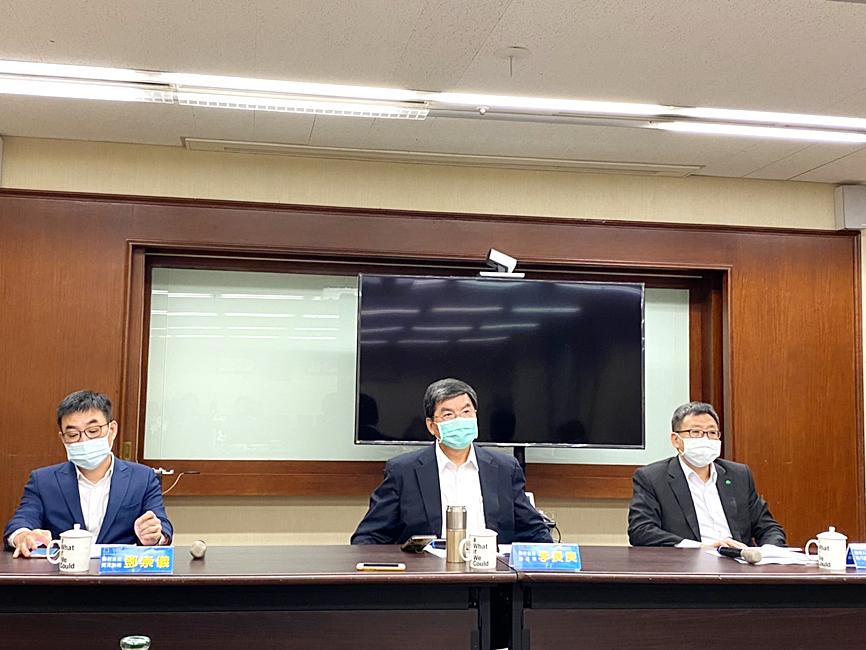Cathay Life Insurance Co (國泰人壽) yesterday said it would recognize an investment loss of NT$8.8 billion (US$298.1 million) in Indonesia’s Bank Mayapada Internasional Tbk PT due to concerns about the lender’s operations amid a corporate scandal.
The company said it would revise its earnings result for June, from a net profit of NT$6.52 billion to a net loss of NT$520 million, its first monthly loss over the past 17 months.
After booking an investment loss of NT$5.2 billion in Bank Mayapada earlier this year, Cathay Life has so far recognized total investment losses of NT$14 billion in the lender, executive vice president Lin Chao-ting (林昭廷) told a news conference in Taipei.

Photo: Wu Chi-lun, Taipei Times
Cathy Life has invested NT$13.3 billion in Bank Mayapada since 2015 and recognized a net profit of NT$700 million over the past five years.
However, the recognized investment loss of NT$8.8 billion has completely written off its investment in the Indonesian lender, Lin said.
The company conducted due diligence of Bank Mayapada at the end of last month, discovering that the lender’s non-performing loan ratio stood at 6.94 percent, higher than the industry average of below 3 percent, although it still made a profit of 143.6 billion rupiah (US$9.73 million) for the first half of this year, Lin said.
Benny Tjokrosaputro, one of the lender’s debtors, was in January named a suspect in a bribery case involving PT Asuransi Jiwasraya, which had also triggered a run on the bank, he said.
Despite its losses of NT$14 billion in the lender, Cathay Life is still considering whether to raise its stake in the lender from 37.33 percent to 51 percent, Cathay Financial Holding Co (國泰金控) president Lee Chang-ken (李長庚) said.
“We are still talking with the Indonesian government and the bank’s controlling shareholder Tahir family about many issues, including how to handle the loans offered to Benny Tjokrosaputro,” Lee said.
“Based on our investment in Vietnam and Cambodia, we believe that if we have controlling power over the investment entity, the returns would be solid. So we are still evaluating if we should be a controlling shareholder in Bank Mayapada,” Lee said.
The insurer might reach a conclusion in three months, he added.
Cathay Life yesterday reported net profit of NT$12.2 billion for last month, the highest for a single month, due to advancing payment of cash dividends, while its cumulative profit for the first seven months rose 29 percent year-on-year to NT$31.5 billion, Lin said.

Shares in Taiwan closed at a new high yesterday, the first trading day of the new year, as contract chipmaker Taiwan Semiconductor Manufacturing Co (TSMC, 台積電) continued to break records amid an artificial intelligence (AI) boom, dealers said. The TAIEX closed up 386.21 points, or 1.33 percent, at 29,349.81, with turnover totaling NT$648.844 billion (US$20.65 billion). “Judging from a stronger Taiwan dollar against the US dollar, I think foreign institutional investors returned from the holidays and brought funds into the local market,” Concord Securities Co (康和證券) analyst Kerry Huang (黃志祺) said. “Foreign investors just rebuilt their positions with TSMC as their top target,

REVENUE PERFORMANCE: Cloud and network products, and electronic components saw strong increases, while smart consumer electronics and computing products fell Hon Hai Precision Industry Co (鴻海精密) yesterday posted 26.51 percent quarterly growth in revenue for last quarter to NT$2.6 trillion (US$82.44 billion), the strongest on record for the period and above expectations, but the company forecast a slight revenue dip this quarter due to seasonal factors. On an annual basis, revenue last quarter grew 22.07 percent, the company said. Analysts on average estimated about NT$2.4 trillion increase. Hon Hai, which assembles servers for Nvidia Corp and iPhones for Apple Inc, is expanding its capacity in the US, adding artificial intelligence (AI) server production in Wisconsin and Texas, where it operates established campuses. This

US President Donald Trump on Friday blocked US photonics firm HieFo Corp’s US$3 million acquisition of assets in New Jersey-based aerospace and defense specialist Emcore Corp, citing national security and China-related concerns. In an order released by the White House, Trump said HieFo was “controlled by a citizen of the People’s Republic of China” and that its 2024 acquisition of Emcore’s businesses led the US president to believe that it might “take action that threatens to impair the national security of the United States.” The order did not name the person or detail Trump’s concerns. “The Transaction is hereby prohibited,”

Garment maker Makalot Industrial Co (聚陽) yesterday reported lower-than-expected fourth-quarter revenue of NT$7.93 billion (US$251.44 million), down 9.48 percent from NT$8.76 billion a year earlier. On a quarterly basis, revenue fell 10.83 percent from NT$8.89 billion, company data showed. The figure was also lower than market expectations of NT$8.05 billion, according to data compiled by Yuanta Securities Investment and Consulting Co (元大投顧), which had projected NT$8.22 billion. Makalot’s revenue this quarter would likely increase by a mid-teens percentage as the industry is entering its high season, Yuanta said. Overall, Makalot’s revenue last year totaled NT$34.43 billion, down 3.08 percent from its record NT$35.52